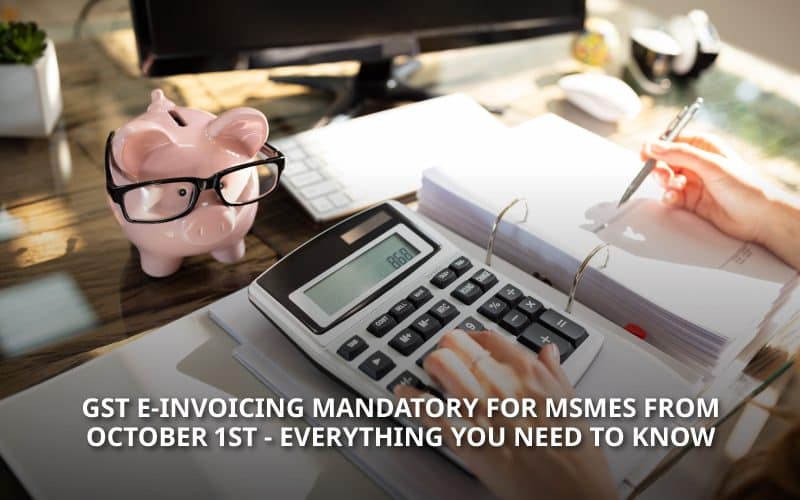The Government has announced it will soon make GST E-invoicing mandatory for MSMEs and industries with a turnover of over ₹ 500 crores.
Should other MSMEs be concerned about it? Turns out, even if your business does not fall into the category, the Government recommends mandatory GST e-invoicing.
Why?
Let’s explore.
What is e-invoicing?
E-invoicing, as per Cleartax’s definition, involves the submission of a generated standard invoice on a common e-invoice portal.
It automates multi-purpose reporting with a one-time input of invoice details between any vendor and supplier.
Simply put, e-invoicing is a system in which invoices between businesses are authenticated by the GST network on the portal.
The Benefits of e-invoicing for MSMEs
- The Government’s motive to introduce e-Invoicing is to ensure that there is interoperability of data.
- Businesses today issue invoices in different formats and e-invoicing will ensure uniformity in data.
- The Government hopes that this will promote B2B communication by reducing errors and cost involved.
- Real-time tracking of invoices by the supplier to avoid duplicating.
Why you need to ensure accurate e-invoicing
The Government’s main intention to introduce the E-invoicing mechanism is to curb tax evasion and reduce fake invoicing.
Claiming Input Tax Credit:
This also benefits businesses when claiming Input Tax Credit. Since input credit is matched with output tax details, it is easier for GSTN to track fake tax credit claims.
Tax authorities acquire access to transactions as they take place in real-time. This happens because the e-invoice will have to be compulsorily generated through the GST portal.
Reducing Fake invoices or duplicate invoices:
Due to non-digitising of invoices by suppliers, there’s an increase in the number of fake or duplicate invoices in the industry. Ensuring mandatory invoicing on the GST portal also ensures easier returns filing process, since it would be captured on a centralised portal.
MastersIndia Webinar – Understanding e-invoicing for MSMEs
” The CBIC has clarified that e-Invoicing does not mean the generation of invoices from a central portal of the tax department.” – Nishank Goyal, CEO MastersIndia
Your business might not fall in the category for e-invoicing yet, but it is safe to assume that all businesses need to maintain GST e-invoices for easier tax benefits, claiming tax refunds, preventing penalties and ensuring ethical business practices. Therefore, if your business wishes to have any GST or invoicing related questions answered, we have something for you!
Please join us LIVE on Facebook on Thursday at 6:30 PM with Nishank Goyal CEO of MastersIndia, to discuss the future of GST in the country. Click on the image below to register!
mojoVersity – Basics of GST
Before setting up a business, it is important to keep in mind, the different legal, and financial requirements for the same. mojoVersity, our exclusive e-learning platform for SMEs, has a specially curated course for any entrepreneur who wishes to learn more about GST.
In this course, you will learn:
- If GST applies to your business
- How to register for GST if applicable to your business
- Various slabs under GST
- HSN/SAC Codes and TDS/TCS
- How to file GST returns
- How to correct Invoices in case of data mismatch
- Advance rulings of GST


